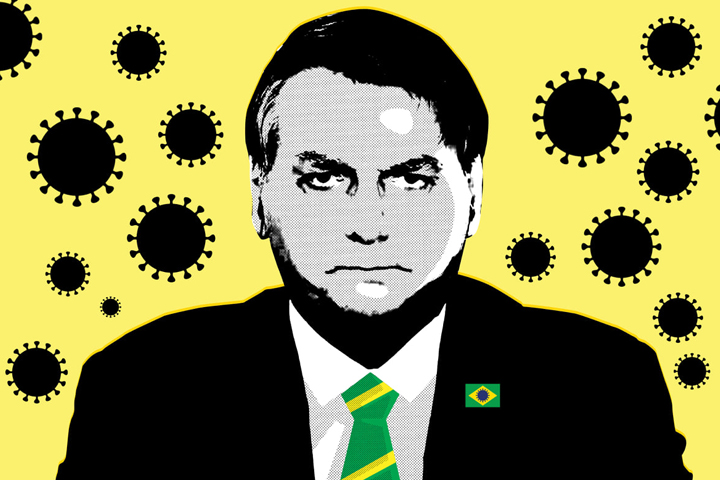The pandemic is out of control in Brazil. According to official data, at the time of writing (21 March) there have already been more than 294,000 people killed by COVID-19. Approximately 2,000 new deaths are registered on average every day. When underreporting is taken into account, these figures are likely to be significantly higher.
In the state of Amazonas in January, dozens of patients died due to a lack of oxygen in hospitals. Now a country-die collapse is taking place. In practically all regions, ICUs are full and patients are dying waiting for beds, both in public and in private health networks. Hospitals are installing cold rooms to store bodies!
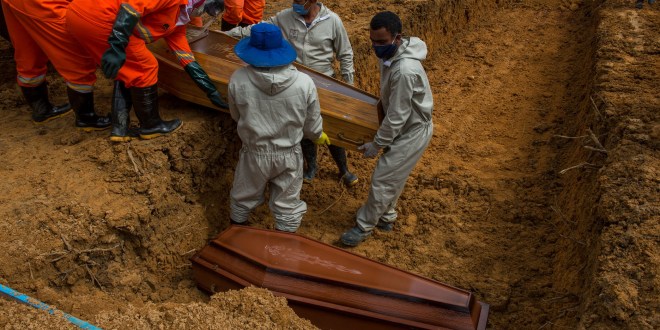 The pandemic in Brazil has claimed 294,000 lives thus far. Bolsonaro has dismissed what he calls "fussing and whining" over these figures / Image: Alex Pazuello, Semcom
The pandemic in Brazil has claimed 294,000 lives thus far. Bolsonaro has dismissed what he calls "fussing and whining" over these figures / Image: Alex Pazuello, Semcom
The government of Jair Bolsonaro is centrally responsible for this situation. Bolsonaro has consistently attempted to minimise the pandemic, referring to COVID-19 as “a little cold”. In March 2020, forecasts were presented that claimed the novel coronavirus would cause fewer deaths than the H1N1 pandemic, which was responsible for approximately 2,000 deaths nationwide in 2009-10.
He advertised ineffective drugs as cures, like chloroquine and ivermectin. He participated in crowds without a mask. Recently, when asked about the latest rise in cases and deaths, he replied, “Enough fussing and whining. How long are you going to cry about this?”
But it is not Bolsonaro alone who is responsible for this situation. His actions are at the service of the economic interests of the big business owners. The reason governors and mayors did too little too late to contain the pandemic, was because they were foremost looking to preserve the profits of the bourgeoisie.
The governor of São Paulo, João Doria, presents himself as the ‘anti-Bolsonaro’ with an eye to the presidential race. But when the nearly 100% of ICU beds in the state were occupied and he decreed lockdown measures, he nevertheless kept non-essential industries working, schools open, and allowed worship in the churches. In other regions where the healthcare system has collapsed, non-essential businesses, restaurants, and bars remain open to the public, but simply with reduced hours. In the big cities, public transportation is as overcrowded as ever at peak times.
This situation, which is completely out of control, has led to the emergence of a variant of the virus in Brazil. This variant is more contagious and apparently causes more serious conditions in younger people.
Meanwhile, Brazil’s GDP fell by 4.1% in 2020. There are approximately 14 million unemployed, according to the official figures, which don’t account for those who have given up looking for a job, or workers in the informal sector working less hours than they would like. Misery is growing. There are 10 million Brazilians suffering from “food insecurity” – that is, who go hungry.
A recent study (XP/Ipesp, 3 March) indicated that those who class Bolsonaro’s government as ‘bad’ or ‘very bad’ has grown to 45%, whilst those who consider it as ‘good’ or ‘great’ have fallen to 30%. In regard to performance combating the pandemic, 61% consider the performance of the president to be ‘bad’ or ‘very bad’.
With regard to the vaccine, just 5.54% of the population has received one dose, and only 1.96% have received both doses. There is, of course, a worldwide delay in vaccination. This is the result of the anarchy of capitalism, with bottlenecks in production occurring due to the private interests of pharmaceutical companies. But in Brazil, Bolsonaro again demonstrated his negligence and incompetence in delaying the purchase of vaccines. He even spoke with disdain of Sinovac, the vaccine originating in Chinese laboratories, which is currently the most used in the national immunisation programme.
A US government report produced under the Trump administration about “[combating] evil influences in the Americas”, included persuading Brazil “to reject the Russian COVID-19 vaccine,” Sputnik V. In 2020, Pfizer offered vaccines to the Brazilian government, but the government refused the offer and later argued that under Pfizer’s terms and conditions, “if [someone who is administered with the vaccine] turns into an alligator, that’s your problem.”
The bourgeoisie itself is increasingly impatient with the government's state of denial and incompetence. Faced with the crisis and the delay in vaccinations, there was yet another changing of the guard at the Ministry of Health. The new minister will be the fourth since the start of the pandemic. Mass vaccination is essential to allow for some economic recovery. The bourgeoisie is also aware of what is happening in Paraguay, where the mismanagement of the pandemic has provoked mass mobilisations for the overthrow of the government of Mario Abdo Benítez, an ally of Bolsonaro.
Lula back in the game
In this context, a supreme court judge, Edson Fachin, decided on 8 March to annul the convictions of ex-president Lula, of the Workers' Party (PT), which had prevented him from standing as a candidate in the 2022 elections. The reason given for annulment was an error in the city in which the case should have been processed, something alleged by Lula's defense since 2016.
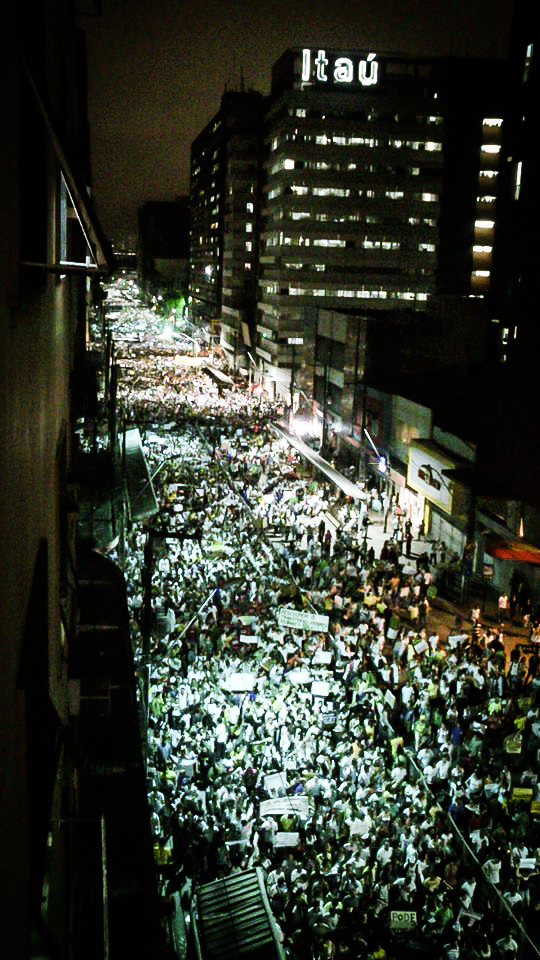 After the 2013 protests, the Brazilian bourgeoisie decided they had little further use for the PT / Image: Ninja Midia
After the 2013 protests, the Brazilian bourgeoisie decided they had little further use for the PT / Image: Ninja Midia
In reality, Edson Fachin did what he did to try to avoid another ongoing trial at the Federal Supreme Court. This is because it would renew discussions around the suspicions surrounding former judge Sergio Moto, who condemned Lula in the first place and who is a symbol of the Lava Jato operation (Operation Car Wash). This trial against Sergio Moro, which has been momentarily suspended, should reaffirm the annulment of Lula’s conviction on account of the bias and abuses committed by the former judge and Operation Car Wash.
Operation Car Wash started in 2014 after the big demonstrations in June 2013 across the country. These demonstrations highlighted how discredited the bourgeois institutions had become, and the inability of the PT (then in government under Dilma Roussef) to control the masses. Operation Car Wash, with the overwhelming support of the bourgeoisie and their media, spearheaded a process aimed at renewing the demoralised political cadres of the bourgeoisie, in a process similar to the ‘Clean Hands’ operation in Italy in the 1990s.
In relation to the PT, which the bourgeoisie no longer had any use for, Operation Car Wash sought to tar the party with what was supposedly the biggest corruption case in Brazil’s history. Although the PT was later turned by the leadership into a party submissive to the interests of the bourgeoisie, thus destroying it as an independent party of the working class, it had originally been built in the 1970s and 80s through independent working-class struggle. In tarring this party, the aim was always something that went beyond the PT itself: the objective was to demoralise and criminalise the workers’ organisations in general.
Esquerda Marxista, the Brazilian section of the IMT, identified the pro-bourgeois political and economic objectives of Operation Car Wash, and opposed the operation, its abuses, and its attacks on democratic freedoms from the very beginning. The convictions without evidence; the rewards for denunciations; the cinematographic arrests; and testimonies leaked to the media were all part of a show created to give the impression that the powerful were now paying for their crimes, and that the country was on its way to putting an end to corruption with the cleansing of the institutions.
However, the political result of Operation Car Wash was the election of Bolsonaro in 2018. The operation played a central role in the electoral fraud that prevented Lula – who was the candidate topping the polls – from running for elections or even from giving interviews during the electoral period, so as not to favor the candidate who replaced him.
Sergio Moro, the judge who condemned Lula, joined the Bolsonaro government as his Minister of Justice, which further evidenced the political bias of the operation. In mid-2019, the website The Intercept Brasil, with reports by journalist Glenn Greenwald, released exchanges of messages on Telegram between members of the operation that proved bias, abuse and its aim of influencing the country's political course.
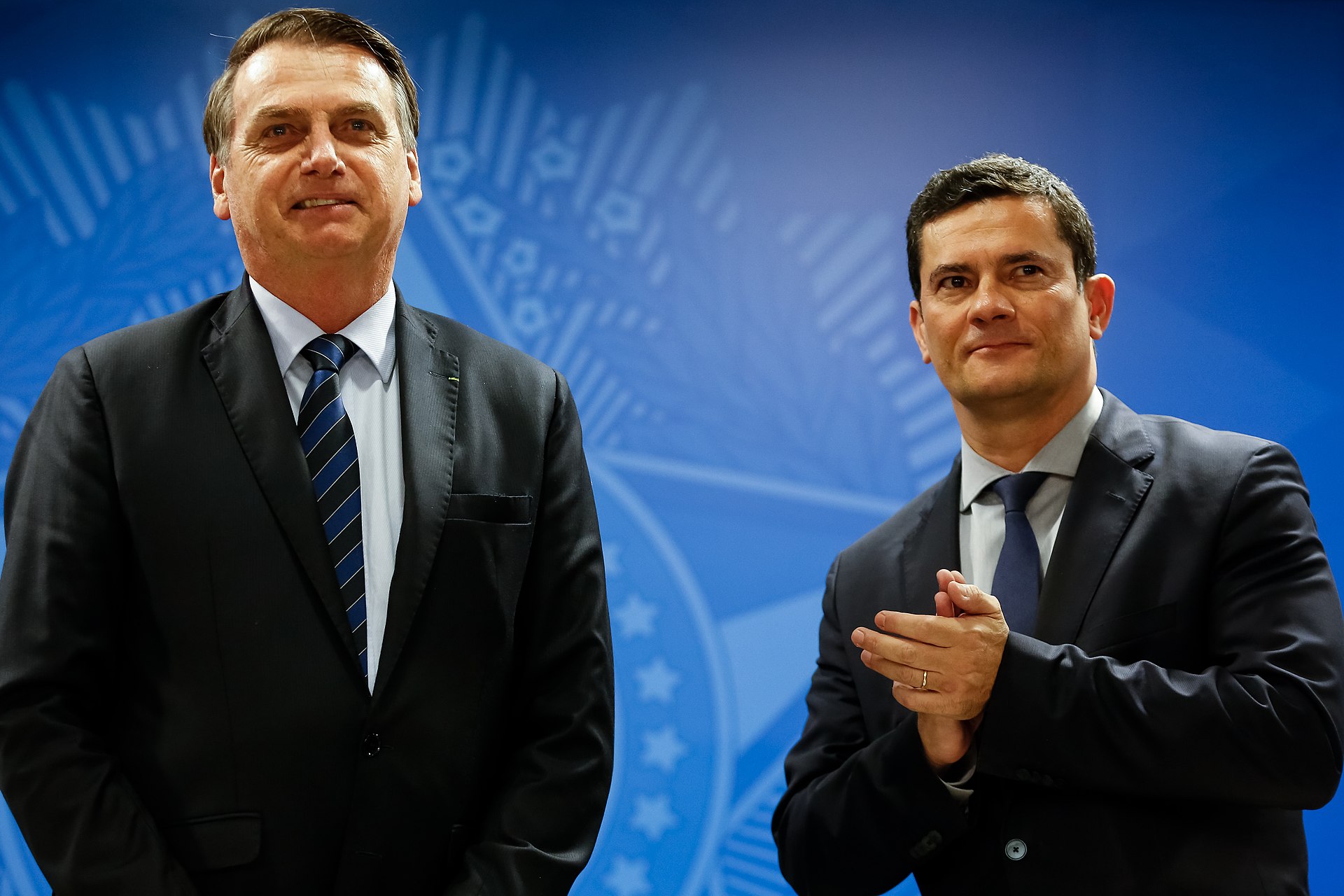 The real reason for the acquittal of Lula was to remove the spotlight from former judge leading the Car Wash case, and also Bolsonaro's ex-Justice Minister, Sergio Moro (right) / Image: Palácio do Planalto
The real reason for the acquittal of Lula was to remove the spotlight from former judge leading the Car Wash case, and also Bolsonaro's ex-Justice Minister, Sergio Moro (right) / Image: Palácio do Planalto
Operation Car Wash, which had previously been useful for the bourgeoisie, was now gradually discarded. Formerly exalted by the mainstream media, it came in for criticism. With the majority of the Federal Supreme Court against it, it suffered losses with the annulment of its decisions.
Lula, released in November 2019 as a revolutionary wave swept Latin America, is now able to run for election again following the annulment of his convictions. He would do so amid a deep economic, political and health crisis. As a candidate, Lula is useful for the bourgeoisie. He can be used to try and reassure the masses, in the face of the tragedy that has engulfed the country, that things can change in the 2022 elections. In the latest polls Lula is projected to receive 50% of the vote, surpassing Bolsonaro and all the other candidates.
On 10 March, Lula gave a speech on the annulment of the convictions. After all the humiliation he suffered, would he now return to take revenge on the bourgeoisie? He reassures everyone: “If there is a citizen who is right to be hurt, it is me. But I’m not.” He reassured the financial market in particular:
Why is the market afraid of me? This market has already lived with the PT for eight years with me and six more with Dilma Rousseff. What is the reasoning? I don't understand this fear, I was called a conciliator when I was president. How many meetings were had with business owners? I said: What do you want? So, let’s build together.”
Inclined to build a “broad front” with sectors of the bourgeoisie, Lula responded:
I see many people talking about a broad front, with PCdoB, PT, PSOL, PSB. This is a left-wing front, there is nothing broad about it. We’ve been doing this since 1989. A broad front is if we have the capacity to talk to other forces that are not on the spectrum of the left. It is possible.
To emphasise this point, Lula recalled a time when he chose José de Alencar, a wealthy businessman from a bourgeois party, to be his deputy in the election in which he was elected for the first time, in 2002:
You can build a program that involves conservative sectors, for example, for vaccines and emergency aid. In 2002, with José Alencar as my deputy, it was the first time that we made an alliance between capital and labor.
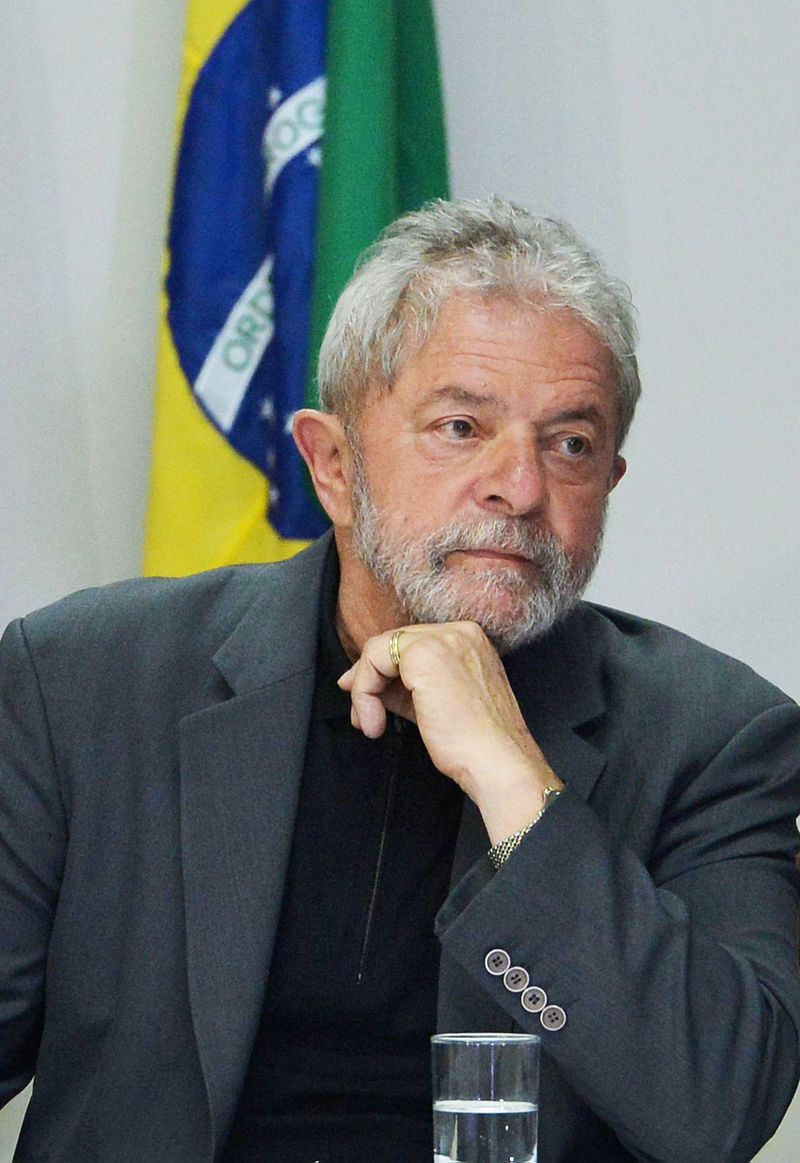 Lula was imprisoned in Operation Car Wash but has now been released and may run in the 2022 elections. The programme he is putting forward is one of class collaboration / Image: Valter Campanato/ABr
Lula was imprisoned in Operation Car Wash but has now been released and may run in the 2022 elections. The programme he is putting forward is one of class collaboration / Image: Valter Campanato/ABr
Lula is trying, once again, to present himself to the bourgeoisie as an alternative, in the face of discontent towards the Bolsonaro government. He wants to revive the alliance between capital and labour. In the days of the PT government, this class collaboration brought great profits for the bourgeoisie, and attacks on workers rights and achievements, with privatisations; the withdrawal of social security rights; the continued payment of fraudulent public debts to the banks and speculators; and even the passing of laws that criminalised popular mobilisations. Dilma was impeached in 2016 not for defending workers rights in the midst of the crisis, but for her inability to get the measures she wanted approved in the National Congress: fiscal adjustment, withdrawal of labour rights, and new attacks on social security.
Down with the Bolsonaro government!
The leaderships of left-wing parties and most of the trade unions (PT, PCdoB, PSOL, CUT, etc.) have blocked the fight to overthrow the government with a massive and independent mobilisation of workers. During 2020 they adopted the slogan “Bolsonaro out” (“Fora Bolsonaro”). This was a slogan that Esquerda Marxista raised at the beginning of 2019 in the teeth of opposition from practically all organisations and leaders of the apparatuses. But once they raised it, they distorted its meaning.
They pointed out that in the 2022 elections, “Fora Bolsonaro” could form the slogan under which they might ally themselves with the bourgeoisie, as Lula now wishes to do. Even the PSOL, a party that experienced relative electoral growth, is adapting itself more and more to the system. It is already beginning to discuss not standing its own candidate in the next election in order to support Lula.
In view of the insufficient methods of the government to protect the lives of workers, the Central Unica dos Trabalhadores (CUT), the largest union center in the country, and the unions should call a general strike demanding a lockdown; the maintenance of wages; vaccines for all; and for the downfall of Bolsonaro. But the union bureaucrats are not prepared to organise real strike action along these lines, and even boycott the strikes they do approve. In practice, they have become accomplices of Bolsonaro and his government in the murderous policies they have carried out in this pandemic.
Despite the blockage of the workers’ leadership, the crisis – the unemployment; the tragedy of more than 2,000 deaths per day with the collapse of the health system – has led to a deepening anger in the depths of society, and has caused the consciousness of the youth and workers to leap forward. Brazil is in the midst of a convulsive international situation. An explosion that does away with bureaucratic and conciliatory leaders, Lula, Bolsonaro, and the rotten powers of the New Republic, cannot be ruled out.

